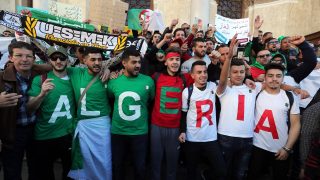On Sunday, 15, 2019, Algeria’s interim president, Abdelkader Bensalah announced that the country will hold a presidential election on the 12th of December. This announcement was made amidst ongoing nationwide protests by Algerians who say they want the government to be completely purged of members of former president Abdelaziz Bouteflika’s 20-year rule.
Owing to elections cancelled in July, Bensalah was forced to remain at the helm of affairs causing him to overstay the constitutional 90-day limit for an interim president. Now he has given in to the demands of army chief Lieutenant General Ahmed Gaed Salah who has repeatedly called for new elections since Bouteflika resigned. Salah had said earlier that it would be appropriate to convene the electorate on the 15th of September, as the situation can no longer tolerate a delay.
In making the announcement on Sunday, Bensalah described the election as the only democratic solution to Algeria’s current crisis echoing Salah’s stance that the current political vacuum in the country must be filled with an elected president. President Bensalah also appointed a new electoral body to organize and oversee the forthcoming electoral process in place of the interior ministry, which has been in charge of elections.
“This body is a concrete response to demands from our people including those seeking a radical change of the system. These changes confirm that the state will go ahead to meet all demands,” he said in an attempt to appeal to protesting citizens. But the newly formed electoral body is to be headed by a former justice minister with ties to Bouteflika’s administration, so the citizenry is bound to kick against it.
Setting up a mediation council has not helped issues. In July, Algerians took to the streets to protest a dialogue and mediation panel put together by the government to mediate between both sides to reach a national consensus to resolve the political crisis. The panel comprises of independent actors from political parties, civil society, trade unions, youths and activists. Still, protesters say the panel does not represent them.
So far, neither the people nor the government wants to give in to each other’s demands hence a political impasse. What the Algerian people want is a fresh democratic start completely rid of the ruling elite including the army chief, Gaed Salah, and for parts of the constitution to be rewritten. But the government simply wants to conduct a new election, apparently suggesting that a new leader signifies a new democracy. The government has made an attempt to appease the people by prosecuting Bouteflika’s allies. A gesture that Algerians seemingly do not care much for as it doesn’t solve the issue at hand.
Considering the state of things, it is hard to determine whether or not the elections scheduled for December will take place. Will the government give in to what the citizenry want? Or will Algerians allow a new democracy mobilized and managed by the old guards? Like Sudan has done recently, it is advised that both sides seek to reach a compromise as soon as possible to restore the country’s economic, social, and political security and confidence among international partners.








